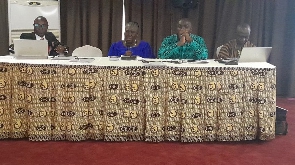KMA leads AMA and TMA in CDD’s Ghana cities monitor after measuring residents’ assessment of economic development, local governance, security, and sanitation among others.
The Kumasi Metropolitan Assembly (KMA) has emerged as the top-performing city in the Ghana Cities Monitor, a study conducted by the Ghana Center for Democratic Development (CDD Ghana) in collaboration with the Hewlett Foundation.
The KMA secured a paltry score of 41%, surpassing the Accra Metropolitan Assembly (AMA) which scored 39.6%, and the Tamale Metropolitan Area (TMA) which came third with 34.2%.
Residents in these three metropolitan areas and twenty other municipalities were asked to assess their cities in the areas of economic development, social services, economic infrastructure, environmental management, local governance, security, and safety.
Local development challenges:
Prince Anokye Aboagye, senior lecturer and local governance expert warned that the figures portended dire consequences for a country rapidly urbanizing at a rate of 56% of its population.
“If people will move to the cities without the requisite services as the survey is revealing, without the critical infrastructure that will drive the competitiveness and growth we desire, then we will not urbanize in wealth as we expect. We will rather urbanize in poverty,” he cautioned.
Anokye Aboagye challenged local government authorities to see the survey as a wake-up call to better the lots of their communities.
“If this is where we are and this is how our citizens perceive us, as duty bearers, then evidently, we need to sit up and start rethinking whether we are living up to the mandate,” he pointed out.
Response from assemblies:
Responding to the findings, an officer of the Local Government Service, Joseph Asibi Bashir contended that assemblies could not be solely blamed for the situation.
He argued that assemblies have undergone a considerable restructuring of their administrative, developmental, and governance procedures over time albeit unsung.
Even though the figures appear below average, assemblies have evolved over the years.
He said: "We even have client service units open to the general public and we are doing a lot".
Asibi Bashir however highlighted the lack of adequate resources as one of the major challenges rendering assemblies inadequate in addressing developmental issues.
"We are saddled with urbanization and resource challenges. A chunk of our budget goes into education and health", he added.
CDD GHANA recommendations:
Gildfred Boateng Asiamah, a research analyst with the Ghana Center for Democratic Development, recommended that the findings were meant for policy advocacy and decision-making among state agencies, assemblies, and the media.
"We have made the findings user-friendly and we hope that the state agencies including the metropolitan and district assemblies will study this report very carefully and strengthen areas where the assessment of citizens is very low".
“For the media, this is reliable and timely evidence of citizen’s feedback on services within our cities. It is a very nice opportunity to drive Policy advocacy and evidence-driven discussions”, he said.
The survey which culminated in the final report focused on six major components including environmental services with particular attention to availability and quality management of sanitation, waste services, and pollution.
It focused on economic services such as the Physical and digital markets, employment status, livelihood activities, and availability of skill training assistance within the cities.
Economic infrastructure such as transportation, housing, water, electricity, and communication were measured.
Social services sampled citizens' views about accessibility, affordability, and quality of education, health, and social protection services.
Local governance and social inclusion assessed participation and accountability in local government activities and social inclusion measures.
Finally, Safety, security, and disaster management measured the citizens' sense of safety, security, the prevalence, and handling of disasters within cities.
Regional News of Monday, 25 September 2023
Source: Ivan Heathcote – Fumador, Contributor













